Die Veranstaltungssprache ist Englisch.
We are facing what some have described as a period of the most radical exponential change in human history. The overlapping emergence of new technologies, including the Internet of Things and Artificial Intelligence, point towards a disturbing scenario in which many of our well established certainties are broken into millions of pieces. Intellectual property is not immune to these challenges. As a tool to encourage innovation and competition in the marketplace, any intellectual property system should be aligned with the development of big-data, AI, and other hybridization technologies. But an intellectual property system also must contribute to sustainable development goals.
The course will examine in a holistic manner the impact emerging technologies and new hybrid technologies may have on intellectual property systems
9 June 2021
The first day will focus on the context of society and markets in which technological disruptions occur and will identify the main challenges of data-driven technologies to innovation and competition.
10 June 2021
The second day will look at the legal and policy challenges, rolling out the two cases (IoT and AI) across the IP landscape.
Participants are encouraged to think beforehand of one example about what they may consider an innovation in their field of expertise that has been motivated by the use of IoT or AI technologies.
In-person if possible or hybrid format.


